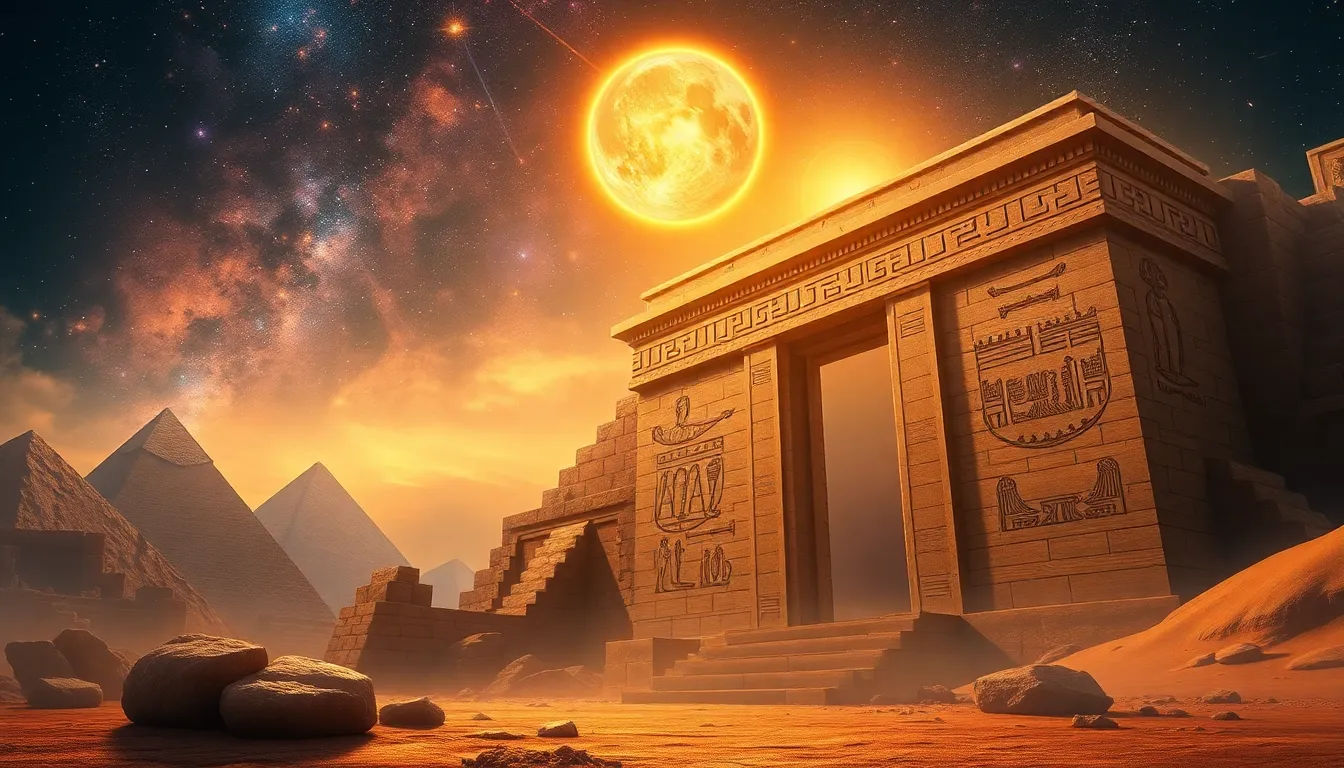The Role of Dreams in Understanding the Cosmic Order of Egypt
I. Introduction
In ancient Egyptian culture, dreams were regarded as significant manifestations of the divine, providing insight into the cosmic order that governed both the universe and human existence. Dreams were not merely the product of the subconscious mind; they were seen as vital communications from the gods, guiding individuals in their daily lives and spiritual journeys.
This article explores the multifaceted role of dreams in ancient Egyptian society, particularly their importance in understanding the cosmic order, known as Ma’at. By delving into the cosmology, symbolism, and rituals surrounding dreams, we aim to shed light on how the ancient Egyptians perceived the intricate relationship between their dreams and the universe.
II. Ancient Egyptian Cosmology
Central to ancient Egyptian belief was the concept of Ma’at, which represented truth, balance, order, and cosmic harmony. This principle was not only foundational to their worldview but also influenced every aspect of their lives, from governance to spirituality.
- Key concepts of the cosmic order (Ma’at): Ma’at was personified by the goddess Ma’at, who symbolized truth and justice, ensuring that the universe remained in harmony.
- The interconnectedness of the universe and human experience: The ancient Egyptians believed that earthly events mirrored cosmic phenomena, emphasizing a deep connection between humanity and the divine.
- Role of deities in shaping the cosmic landscape: Gods such as Ra, Osiris, and Isis played crucial roles in maintaining the cosmic order, and their stories often intertwined with the dreams of mortals.
III. Dreams as a Gateway to the Divine
Throughout ancient Egyptian history, dreams were seen as a bridge between the mortal realm and the divine. They were believed to carry messages from the gods, offering guidance and foretelling future events.
- Historical perspectives on the interpretation of dreams: Dream interpretation was a respected practice, with individuals seeking the counsel of priests and wise figures skilled in understanding the symbolism of dreams.
- Dreams as messages from the gods: Dreams were thought to convey divine wisdom, warnings, or encouragement, often influencing decisions in personal and political matters.
- Case studies of notable dream interpretations in ancient texts: Texts like the “Dream Book” of ancient Egypt cataloged various dreams and their interpretations, providing insight into how dreams were understood and valued.
https://www.youtube.com/watch?v=3UwXy6oP78M
IV. Symbolism and Imagery in Egyptian Dreams
The dreams of the ancient Egyptians were rich in symbolism and imagery, often reflecting their beliefs, fears, and hopes. Certain themes and symbols were commonly encountered in dreams.
- Common symbols and themes found in Egyptian dreams: Dreams frequently featured elements such as water, light, darkness, and animals, each carrying specific meanings.
- The significance of animals, gods, and natural elements: Animals like the lion or the falcon symbolized strength and divinity, while gods appearing in dreams indicated a direct connection to the divine.
- How dream symbolism reflects the broader cosmic order: The imagery within dreams often echoed the principles of Ma’at, illustrating the balance and harmony that were essential to the universe.
V. Rituals and Practices Surrounding Dream Interpretation
Dream interpretation was often accompanied by rituals and practices designed to enhance the clarity and significance of dreams.
- Methods of dream interpretation used by ancient Egyptians: Techniques included meditation, prayer, and the use of specific symbols to unlock the meanings behind dreams.
- The role of priests and priestesses in the interpretation process: These spiritual leaders were trained in the art of dream interpretation, helping individuals decipher their dreams in the context of their lives.
- Rituals designed to enhance dream experiences: Practices such as sleeping in sacred spaces or using amulets were believed to invite divine dreams and protect against negative influences.
VI. Psychological Perspectives on Dreams in Ancient Egypt
From a psychological standpoint, dreams in ancient Egypt were closely tied to the subconscious mind, serving as a tool for personal and societal guidance.
- The relationship between dreams and the subconscious mind: Ancient Egyptians recognized that dreams could reveal deeper truths about an individual’s psyche, often reflecting their desires and fears.
- How dreams were used for personal and societal guidance: Leaders and commoners alike consulted their dreams to make decisions, indicating their importance in shaping both personal and communal destinies.
- Modern psychoanalytic interpretations of ancient Egyptian dreams: Contemporary psychologists have drawn parallels between ancient interpretations of dreams and modern psychoanalytic theories, highlighting the timeless nature of dream analysis.
VII. The Legacy of Egyptian Dream Interpretation
The practice of dream interpretation in ancient Egypt has left a lasting legacy that extends beyond its time and culture.
- Influence of Egyptian dream practices on other cultures: The methods and concepts developed by the ancient Egyptians influenced subsequent civilizations, including the Greeks and Romans.
- Preservation of dream texts and their significance today: Ancient texts detailing dream interpretation continue to be studied, providing invaluable insights into the beliefs and practices of ancient Egyptians.
- Continuing relevance of dream analysis in contemporary spirituality: Many modern spiritual practices still draw upon the ideas of dreams as pathways to understanding oneself and the universe.
VIII. Conclusion
In summary, dreams played a vital role in understanding the cosmic order of ancient Egypt. They were viewed as divine messages that provided insight into the interconnectedness of the universe and human experience. The rich symbolism and rituals surrounding dreams reflect a profound engagement with spirituality and the cosmos.
As we explore the intersection of dreams, spirituality, and the cosmos, we are invited to appreciate the depth of ancient Egyptian beliefs and their relevance in our contemporary world. The legacy of Egyptian dream interpretation encourages us to continue exploring the significance of dreams across cultures and time.




